
Tiny Home Regulations in Tennessee: The Complete Guide
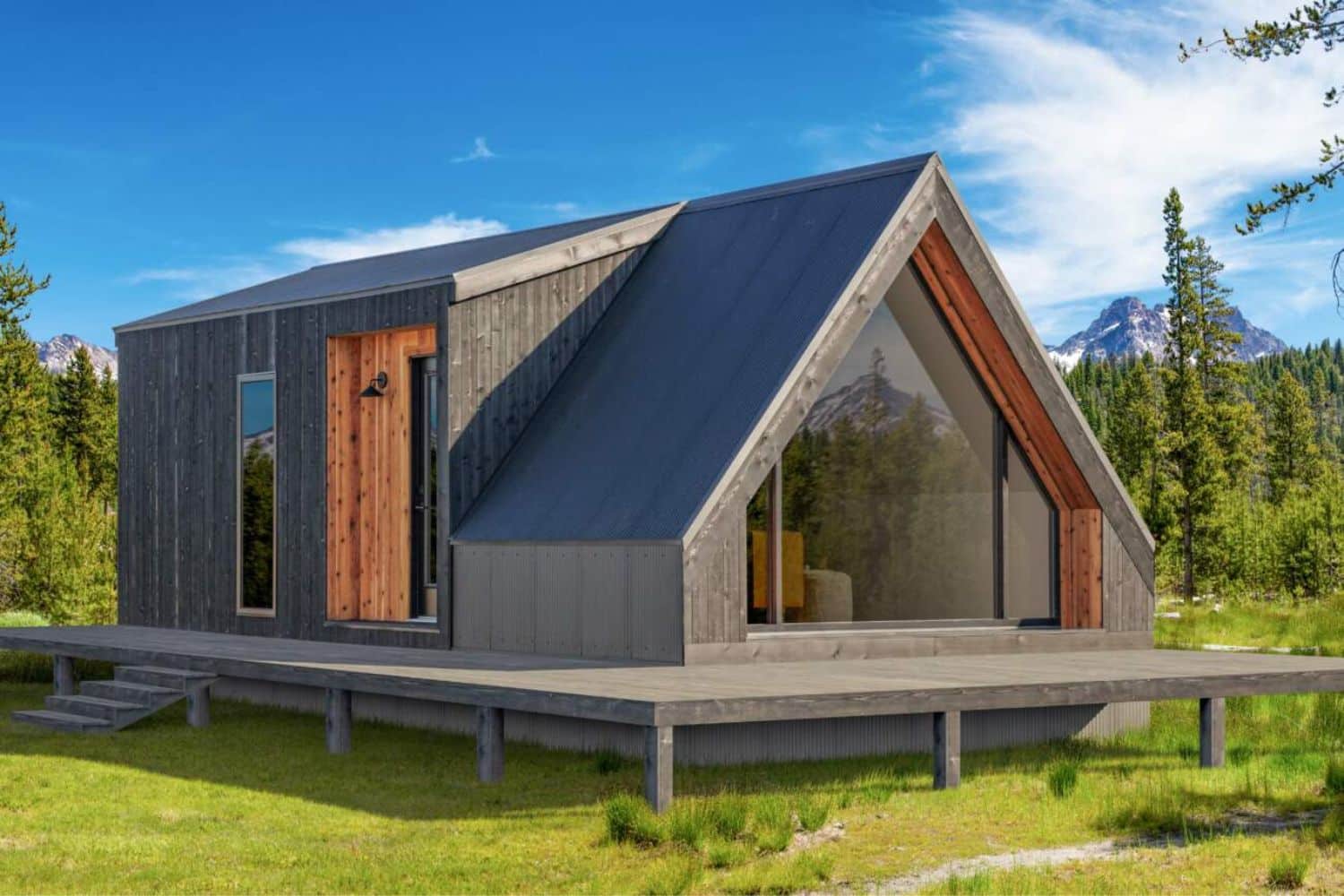
“Sittin’ on the front porch on a summer afternoon” in a Tennessee tiny home sounds sweeter than music! But how do you make that dream of living on the mountain, amongst the honeysuckle and the eagle’s wings, come true? A tiny home in Tennessee is a great way to explore everything sweet sweet Tennessee has to offer.
Years ago, if someone mentioned the words “tiny home,” nobody would have known what they meant. Tiny homes have surged in popularity over the past decade, and the trend shows no signs of fading anytime soon. If this is your first time checking out the world of tiny homes, you’re probably asking questions like “What is a tiny house?” or “What are the regulations regarding tiny houses in TN?” and “What is the difference between a park model home and a tiny house”?
Keep reading as we break down every tiny-home-regulation-related question for the state of Tennessee. By the end, you’ll be laughing, talking, and making future plans for your brand new Tennessee tiny home.
Are Tiny Homes Legal in Tennessee?
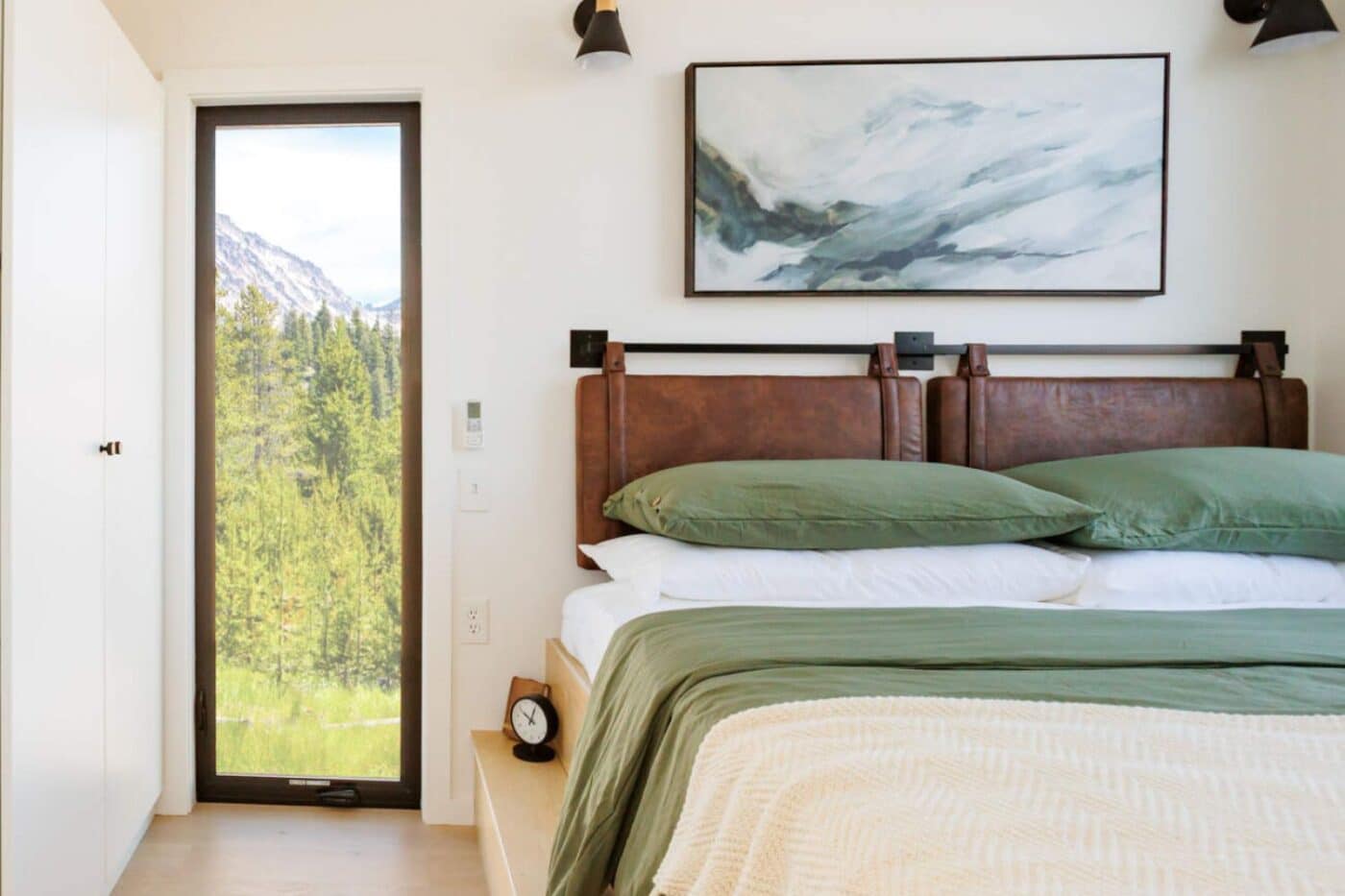
Yes! Tiny homes are legal in Tennessee.
Tennessee has adopted the International Residential Code (IRC), which regulates tiny homes of 400 sq ft or less. The code includes the adoption of Appendix Q, which offers specific guidelines for tiny homes intended as permanent residences. In Tennessee, tiny house regulations require a minimum ceiling height of 6 feet 8 inches in living areas, 6 feet 4 inches in bathrooms and kitchens, and 6 feet 2 inches in stairways. If the tiny home features a loft, it must be at least 35 square feet, with an emergency exit, such as a skylight or roof window. Each room must measure no less than 70 square feet, and all tiny homes should be connected to water, sewage, and electrical services.
Most city laws do not allow tiny homes on wheels or additional tiny homes in the backyards of smaller lots with existing homes. However, tiny homes on wheels, or park-model tiny homes, are usually still allowed in recreational vehicles or mobile home parks. A permit is usually required to build or place a tiny home throughout the state.
Are park models and tiny homes the same thing?
Yes. All Park Models that are built by Zook Cabins are considered THOWS. All of the park models that we build are built to RVIA ASNI 119.5 standards. However, not all tiny homes are built to that standard. Take a look at our blog RVIA VS NOAH Tiny Homes to learn the difference between these two popular certifications.
Legal Tiny Homes In Tennessee
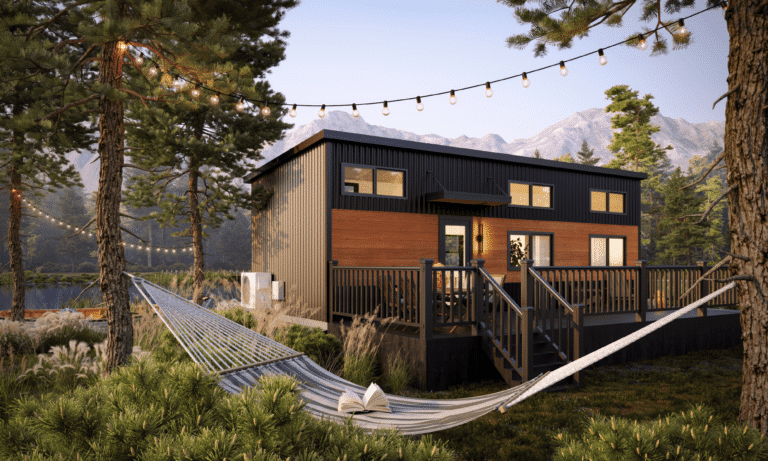
The Cascade
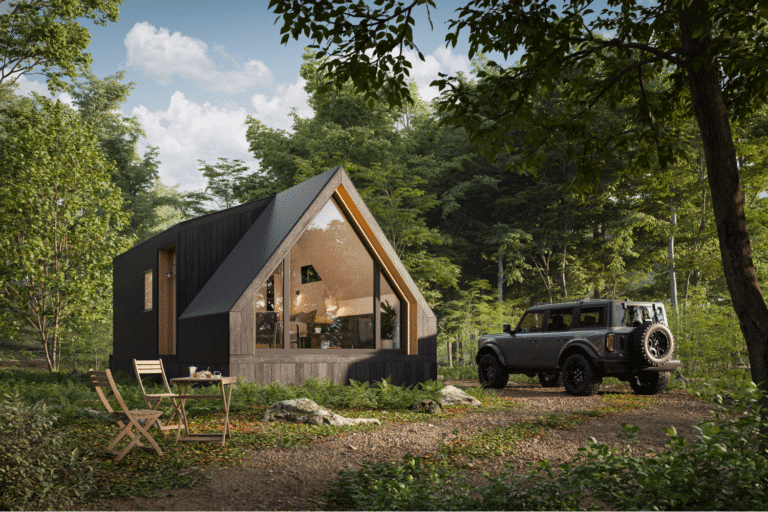
The A-Frame Studio
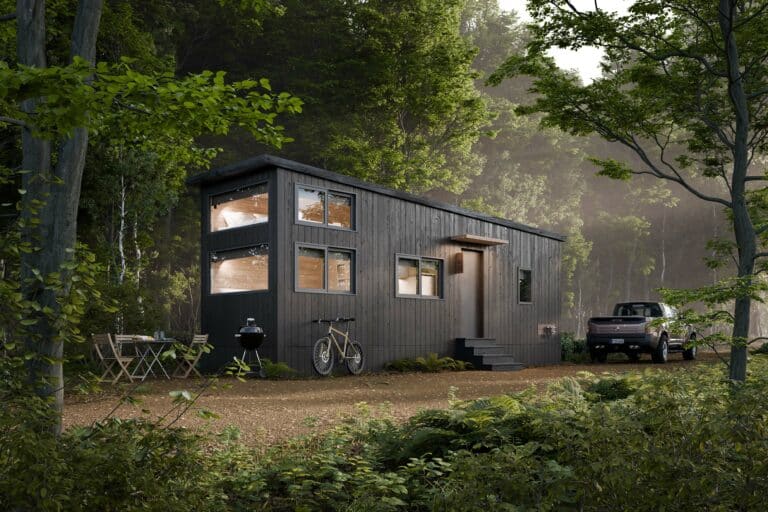
The Nook Family
What Counties in Tennessee Allow Tiny Homes?
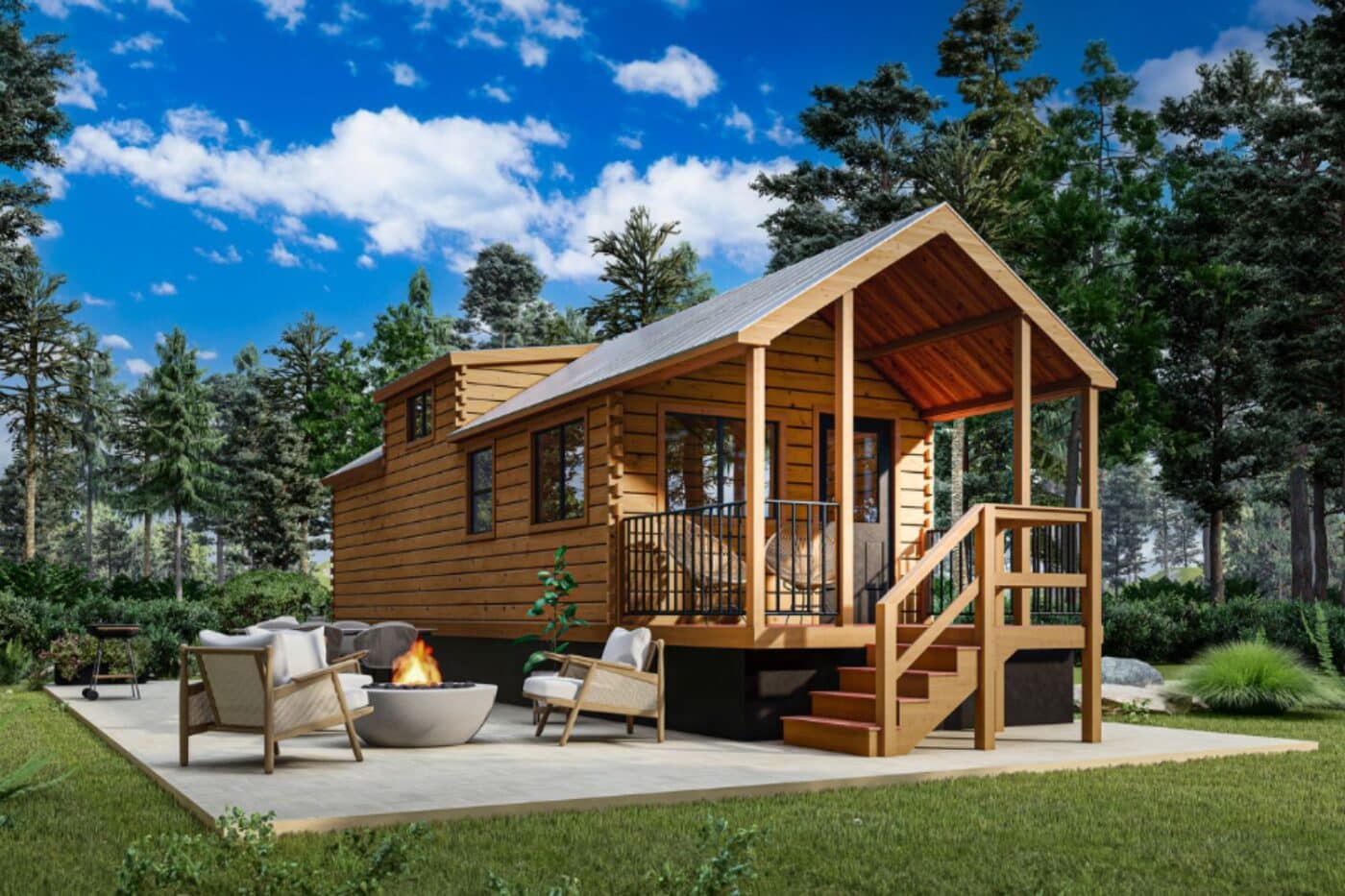
Most counties in Tennessee allow tiny homes in some form! Because Tennessee is predominantly a rural state, many counties have not adopted their own building code and either don’t have a building code or use the state of Tennessee’s code. Therefore, tiny home regulations in Tennessee can vary widely by county, city, area, and zoned district. This is why it’s important to check in and ensure your tiny home meets all the requirements for the area it is placed in. Use this table below to check your county’s tiny home regulations.
A great public resource for information on tiny homes is this Facebook group called Tennessee Tiny Homes. You can ask questions about your specific county to determine if a park model home is legal in your area!
Does Anderson County, Tennessee allow tiny homes?
Yes, tiny homes are allowed in Anderson County, Tennessee. Homes should follow the specifications outlined by Appendix Q of the IRC. In Anderson County, homes must be either on a foundation or in a mobile home, recreational vehicle, or campground park. Tiny homes must be hooked to county utilities, including public water and sanitary sewer systems. Regulations may vary by city or town within Anderson County, so be sure to check with your local area’s planning and zoning office for the tiny home regulations most applicable to you.
Does Bedford County, Tennessee allow tiny homes?
Yes! Tiny homes are allowed in Bedford County, Tennessee. Tiny homes must meet residential building codes, and a permit is required before building or placing a tiny home in Bedford County, Tennessee. Bedford County has adopted the International Residential Code (IRC), and tiny homes should meet the specifications for residential structures outlined by the IRC.
Additionally, Bedford County requires that tiny homes be on a permanent foundation, attached to an approved subsurface sewage disposal system, meet energy code and installation requirements, have an approved heat source, have a permanent potable water source, and have no habitable rooms smaller than 70 sq ft. Make sure you confirm Bedford County’s complete list of tiny home requirements and double-check with your local area’s regulations, as tiny home laws are not uniform across counties.
Does Benton County, Tennessee allow tiny homes?
Yes! Tiny homes are allowed in Benton County, Tennessee. Benton County does not have its own residential building codes and has opted out of the state’s building code. However, cities within Benton County could still have adopted building codes. For example, Camden City has adopted the International Residential Code, which all structures and building projects must follow with a permit within Camden city limits. If you are in an incorporated part of Benton County, check your local city’s regulations to determine if there are building codes you must follow to build your tiny home.
Does Bledsoe County, Tennessee allow tiny homes?
Yes, Bledsoe County, Tennessee, does allow tiny homes. Bledsoe does not have its own specific building codes, which means that it follows Tennessee’s residential building code. Tennessee has adopted the International Residential Code, which permits tiny homes that meet all regulations stipulated in Appendix Q. It is also possible that Bledsoe County handles its own building permits; if not, then building permits are also approved at the state level. If you’re considering Bledsoe County as the spot for your next tiny home, verify local tiny home requirements with your local authorities!
Does Blount County, Tennessee allow tiny homes?
Yes. Tiny homes are allowed in Blount County, Tennessee. Blount County follows Tennessee’s state guidelines and the International Residential Code (IRC). The IRC regulates tiny houses that are 400 sq ft or less, on a permanent foundation, and hooked to county or city utilities. Tiny homes must meet other specifications outlined by the IRC and any additional local city or town tiny home regulations. Additionally, a permit is required in Blount County, Tennessee, to build or place a small home.
Does Bradley County, Tennessee allow tiny homes?
Yes! Tiny homes are legal in Bradley County, Tennessee! Bradley County, Tennessee, has adopted the International Building Code, which regulates tiny homes of 400 sq ft or less under its Appendix Q. Tiny homes may not be allowed in every area or zoned district in Bradley County, so be sure to check your city or town’s planning and zoning office to ensure that your tiny home meets local code as well!
Does Campbell County, Tennessee allow tiny homes?
Yes. Campbell County, Tennessee, does allow tiny homes. The county does not have its own building codes, so the area follows the state’s building code. The state of Tennessee has adopted the International Residential Code (IRC), which permits tiny homes under 400 sq ft that follow specifications like foundation, room area, and utility requirements. A permit is required for all new buildings. Check your local area’s zoning requirements, as specific regulations may differ within the county.
Does Cannon County, Tennessee allow tiny homes?
Yes! Tiny homes are allowed in Cannon County, Tennessee. Cannon County defines tiny homes as portable dwellings that are less than 400 sq ft and can be transported on a trailer like a mobile home. Tiny homes should have a full bathroom, kitchen, and plumbing and electrical connections. Site-built tiny homes should follow the regulations for residential buildings in the district they are placed in. Check your local area’s planning and zoning office, as permit requirements and tiny home regulations in Cannon County may differ between cities.
Does Carroll County, Tennessee allow tiny homes?
Yes. Carroll County, Tennessee, has opted out of adopting Tennessee’s state-wide residential building code. This means that tiny home builders in Carroll County, Tennessee, have a lot of flexibility when it comes to the construction process. This does not mean that there are no regulations throughout the county. Cities within Carroll County may have adopted their own building code, and it is likely that a permit will be required in most places to ensure compliance with the state’s fire department. Check your local regulations to ensure your tiny home follows the specific rules for your particular area.
Does Carter County, Tennessee allow tiny homes?
Yes. Carter County, Tennessee, does allow tiny homes. However, these homes must meet very specific standards. Tiny homes can be no smaller than 200 sq ft and no larger than 400 sq ft. Tiny homes can either be site-built or prefabricated and permanently anchored to a foundation. Tiny houses should meet the International Residential Code and National Electrical Code and may not be placed in low-density residential districts. However, after all those specifications are met, you can totally enjoy tiny living in Carter County. Check with your local area’s tiny home regulations, as laws often differ by city or town, and there may be more local specifications for your tiny home to meet.
Does Cheatham County, Tennessee allow tiny homes?
Yes! Tiny homes are allowed in Cheatham County, Tennessee. These homes should have fully supported exterior walls and be attached to a permanent foundation. Homes should meet all regulations for residential buildings outlined by the International Residential Code. Building permits are required to build or place a tiny house in Cheatham County, Tennessee. Check with your local area’s planning and zoning office to find your local tiny home laws, as regulations sometimes differ between cities or towns within a county.
Does Chester County, Tennessee allow tiny homes?
Yes. Chester County, Tennessee, does allow tiny homes. The county requires a building permit for all tiny homes built or placed in the county. Additionally, the county follows the state’s building codes and the International Residential Code (IRC), which provide specifications for tiny homes of 400 sq ft or less. The city of Henderson manages zoning permits for the county. Check-in with building permit requirements, the IRC, and the City of Henderson’s zoning plan to ensure your tiny home follows regulations for all three.
Does Claiborne County, Tennessee allow tiny homes?
Yes, Claiborne County, Tennessee, does allow tiny homes. The county as a whole has opted out of Tennessee’s state residential code. However, Claiborne County does require building permits for electrical work and for manufactured and modular homes. Incorporated parts of the county have adopted the International Residential Code (IRC) for residential buildings. Regulations may vary by area, especially because the county has no county-wide code, so be sure to check your local planning or zoning office for the most accurate tiny home regulations for your area.
Does Clay County, Tennessee allow tiny homes?
Yes. Clay County, Tennessee, does allow tiny homes. Clay County follows the state’s regulations for residential buildings. Tennessee has adopted the International Residential Code, which permits tiny homes with certain specifications under its Appendix Q. State permits for construction are required before building or placing a tiny house in Clay County, Tennessee. Homes should be on a permanent foundation and be connected to county or city utilities. Regulations may differ by city or town within Clay County, so be sure to check your local laws to ensure that your tiny home is legal in your area.
Does Cocke County, Tennessee allow tiny homes?
Yes! Tiny homes are allowed in Cocke County, Tennessee. Cocke County defines tiny homes as permanent residential dwellings smaller than 400 sq ft and built on a chassis or installed on a permanent foundation. Tiny homes must be inspected through the state fire marshal’s office before being placed or built. Tiny homes on wheels should be placed in a tiny home park. A permit is required to build or place a tiny home in Cocke County. Check with your local planning or zoning office to find the most accurate information about your location’s tiny home regulations, as laws differ throughout Tennessee.
Does Coffee County, Tennessee allow tiny homes?
Yes, tiny homes are legal in Coffee County, Tennessee. Coffee County has adopted the International Residential Code for residential buildings in the county. Permits are also required in Coffee County. Tiny homes in Coffee County should be on a permanent foundation, connected to county or city utilities, and meet other floor and room area specifications. Residential homes in Coffee County must pass several inspections before occupation is allowed. Check in with your local area’s planning and zoning office to confirm your tiny home meets all necessary specifications for your specific location.
Does Cumberland County, Tennessee allow tiny homes?
Yes. Tiny homes are allowed in Cumberland County, Tennessee. Residential buildings of all sizes must have one habitable room with at least 150 sq ft, and additional habitable rooms should be no smaller than 70 sq ft. Rooms should have at least 7 ft. Smoke detectors with audible alarms are required outside sleeping rooms. Tiny homes should be placed on a permanent foundation or skirted with approved skirting for the zoned district or park they are placed in. Check your local area’s regulations, as laws often differ between cities, towns, and regions.
Does Davidson County, Tennessee allow tiny homes?
Yes, tiny homes are allowed in Davidson County. Because Davidson County is primarily an urban area, regulations are a little more strict than those in other areas in Tennessee. In general, tiny homes are most frequently allowed as accessory dwelling units on the same property as a primary residential building. These homes must not be larger than 700 sq ft and may have a ceiling height no smaller than 6 ft 8in. Check your local area’s code to determine if there are any specific regulations for tiny homes in your location.
Does Nashville, Tennessee allow tiny homes?
Yes. Nashville, Tennessee, allows tiny homes in some forms. Nashville, Tennessee, has adopted the International Building Code, which permits tiny homes. However, Nashville’s zoning code severely limits tiny homes. In general, tiny homes are most frequently allowed as accessory dwelling units on the same property as a primary residential building. These homes must not be larger than 700 sq ft and may have a ceiling height no smaller than 6 ft 8in. Check your local area’s code to determine if there are any other specific regulations for tiny homes in your location.
Does Decatur County, Tennessee allow tiny homes?
Yes. Decatur County, Tennessee, does allow tiny homes. These homes must be no smaller than 320 sq ft and designed to be used as permanent dwellings either on or without a permanent foundation. Tiny homes should be connected to plumbing, heating, air conditioning, and electrical utilities. Permits are required to build or place a tiny house in Decatur County, Tennessee. Verify these regulations with your local planning or zoning office, as building codes and regulations often vary between cities within a county.
Does DeKalb County, Tennessee allow tiny homes?
Yes. Tiny homes are legal in DeKalb County, Tennessee. Dekalb County does not have its own building code, but it has adopted the state of Tennessee’s building codes. The state of Tennessee has adopted the International Residential Code, which permits tiny homes smaller than 400 sq ft that also meet certain loft, ceiling height, emergency escape, and area requirements. Building permits are required for residential buildings in DeKalb County. Check your local area’s planning and zoning code to ensure that your tiny home follows the specific regulations for your location.
Does Dickson County, Tennessee allow tiny homes?
Yes. Tiny homes are allowed in Dickson County, Tennessee. A permit is required to build or place a tiny house on site. All homes should either have skirting or be attached to a permanent foundation. Tiny homes should meet all codes required for residential buildings in the district they are placed in. Check your local zoning and building code for a complete list of all local laws your tiny home must follow.
Does Dyer County, Tennessee allow tiny homes?
Yes! Tiny homes are allowed in Dyer County, Tennessee, provided that they meet Dyer County’s conditions, including being securely installed to a permanent foundation or securely underpinned, covered in conventional exterior materials, have their hitches or towing apparatus removed, be connected to public utilities, be no taller than two stories in height, and more. Tennessee requires a building permit for all new construction, including tiny homes. You can contact the Dyer County Building & Zoning Office for more information on permits and setbacks and to find additional requirements for your specific area or zoned district.
Does Fayette County, Tennessee allow tiny homes?
Yes. Tiny homes are allowed in most but not all zoned districts in Fayette County, Tennessee. Tiny homes should follow the regulations for residential buildings outlined for the specific district they are located in. A permit is required to build or place a tiny house in Fayette County. Check your local zoning and building code to find the specific regulations for tiny homes in your area.
Does Fentress County, Tennessee allow tiny homes?
Yes. Fentress County, Tennessee, does allow tiny homes. Fentress County does not have its own zoning or building code, which means that it follows the state’s building code and permit requirements. However, the city of Jamestown, within Fentress County, does have zoning and permit laws for residential structures. The state of Tennessee’s building and zoning code does allow tiny homes that meet ceiling height, loft, emergency escape, and other requirements. Check the appropriate code for your area, as regulations can vary widely by city or town!
Does Franklin County, Tennessee allow tiny homes?
Yes. Tiny homes are allowed in Franklin County, Tennessee. Tiny homes can be on a permanent chassis or on a permanent foundation. Tiny homes that are placed in flood areas must be securely anchored to a foundation system. Otherwise, tiny homes should meet other residential building code specifications for the district they are placed in. Permits are required to build or place tiny homes in Franklin County, Tennessee. Check your local area’s regulations, as tiny home laws often differ by city or town within Franklin County.
Does Giles County, Tennessee allow tiny homes?
Yes. Giles County, Tennessee, does allow tiny homes. Giles County does not have county-wide zoning or building codes. Instead, areas outside of city limits in Giles County follow the state of Tennessee’s residential code, which permits tiny homes! Permits are also required and should be applied for at the state level. For incorporated cities in Giles County, like Ardmore, Elkton, Minor Hill, Lynnville, and Pulaski, local city codes and regulations apply to the tiny home in question. Check your area’s zoning code to determine which regulations your tiny home must follow.
Does Grainger County, Tennessee allow tiny homes?
Yes. Like many rural counties in Tennessee, Grainger County, TN, does not have its own building codes. This means that, unless otherwise specified, Grainger County follows the state of Tennessee’s residential code, the International Residential Code, which permits tiny homes of less than 400 sq ft that meet specific conditions. It is possible that cities within Grainger County have adopted their own building code or permit requirements. And, in most cases, permits are required to build or place tiny homes. Check with your local government to see if there are any local ordinances that might apply to your tiny house.
Does Greene County, Tennessee allow tiny homes?
Yes. Tiny homes are legal in Greene County, Tennessee. Tiny houses in Greene County must meet the minimum size required of the International Building Code, must be inspected by the state of Tennessee, and must be permanently connected to water, sewer, and electrical utilities. Tiny homes can either be on wheels with underpinning or on a permanent foundation. Check your local area’s regulations to determine what specific tiny home regulations your tiny home must follow!
Does Grundy County, Tennessee allow tiny homes?
Yes. Grundy County, Tennessee, does allow tiny houses. Tiny homes on a permanent foundation are permitted in tiny house subdivisions, mobile home parks, and R-4 (multiple-family) districts. Tiny homes on wheels are allowed only in approved campgrounds. Every tiny home in Grundy County should have basic cooking, sleeping, and sanitation areas. Tiny houses should not be smaller than 600 sq ft. Building permits are required to build or place tiny homes in the county! Tiny homes should be connected to county utilities. Check your local area to find out what zoned district you are in and what kind of tiny home is allowed there.
Does Hamblen County, Tennessee allow tiny homes?
Yes. Tiny homes are allowed in Hamblen County, Tennessee. Hamblen County follows the International Building Code and Residential Code, which permits tiny homes through the special Appendix Q. Building permits are required to build or place a tiny house in Hamblen County. Tiny homes should be on a permanent foundation or securely elevated, anchored, and skirted. Check your local planning office to find out if there are more localized tiny home laws in your area that could apply to you.
Does Hamilton County, Tennessee allow tiny homes?
Yes. Hamilton County, Tennessee, allows some, but not all, tiny homes. Hamilton County allows site-built tiny homes and tiny homes on a permanent foundation. Unfortunately, Hamilton County does not permit tiny homes on wheels or park model-style homes. Check your local area’s planning and zoning code to determine if and what kind of tiny home is allowed in your location.
Does Chattanooga, Tennessee allow tiny homes?
No. Unfortunately, tiny homes are not widely accepted in Chattanooga, Tennessee. Hamilton County, in general, is not as accepting of tiny homes as most places in Tennessee, which makes their status in Chattanooga a little murky. The Chattanooga City Council has passed a special ordinance that allows Accessory Dwelling Units (ADUs) on the same site as a primary building. Of course, tiny homes are not the same as ADUs, although some ADUs can be tiny homes. Chattanooga does not permit tiny homes on wheels at all in this new ordinance. While ADUs are not the same as Tiny Homes on Wheels, this approval of ADUs marks a first step towards a broader acceptance of tiny homes in Chattanooga and Hamilton County.
Does Hancock County, Tennessee allow tiny homes?
Yes. Hancock County, Tennessee, does allow tiny homes. Hancock County does not have formal building codes, which means there is some flexibility for tiny home builders in the county. A building permit may still be required throughout the county, and incorporated parts of the county may have adopted their own building or zoning code. Call the mayor’s office for permit requirements and to check if your local area has building regulations you should comply with.
Does Hardeman County, Tennessee allow tiny homes?
Yes, Hardeman County, Tennessee, does allow tiny homes. A building permit is required to build or place a tiny house in Hardeman County. Hardeman County follows Tennessee’s tiny home laws, which are based on the International Residential Code (IRC). The IRC allows tiny homes that meet specific standards, such as ceiling height, emergency exit compliance, loft and stair regulations, and more. Check the IRC and your local area’s zoning compliance office to ensure your tiny home meets all state and local requirements.
Does Hardin County, Tennessee allow tiny homes?
Yes. Tiny homes are permitted in Hardin County, Tennessee. Tiny homes should be on a permanent foundation or properly elevated, anchored, and skirted. Tiny homes should be attached to county utilities, including water, sewage, and electricity. A building permit is required to build or place a tiny home in Hardin County. Tiny homes should also have a minimum ceiling height of 7 ft and one room of 150 sq ft or larger. Check your local area’s zoning and building code, as tiny home regulations often vary between cities or towns within counties in Tennessee.
Does Hawkins County, Tennessee allow tiny homes?
Yes. Hawkins County, Tennessee, does allow tiny homes. Hawkins County does have its own building code and requirements; however, they are general and primarily enforce lot sizes and setbacks and require utilities for tiny homes. Cities within Hawkins County have adopted different building codes, mainly the International Building Code. A building permit issued by the state of Tennessee may be required to build or place your tiny home in Hawkins County. For specific guidelines for your Hawkins County, Tennessee tiny home, contact the county’s building or planning office for updates to building rules and exceptions.
Does Haywood County, Tennessee allow tiny homes?
Yes. Tiny homes are allowed in Haywood County, Tennessee. Haywood County has adopted the International Building Code, which permits tiny homes that meet specific standards such as ceiling height, egress windows, and utility requirements. Tiny homes should be on a permanent foundation or properly anchored and skirted. A building permit is required to build or place a tiny house in Haywood County. Check your local area’s requirements to determine if there are any more local ordinances for your tiny home to follow.
Does Henderson County, Tennessee allow tiny homes?
Yes! Henderson County, Tennessee, does allow tiny homes. The county has adopted the International Residential Code. This code permits tiny homes that meet certain safety specifications like ceiling height, emergency exit, and utility requirements. A permit is required to build or place a tiny house in Henderson County. Check with your local zoned district or government office for the most complete list of tiny home laws that apply to your area.
Does Henry County, Tennessee allow tiny homes?
Yes. Henry County, Tennessee, does allow tiny homes. The county does not have local zoning regulations for unincorporated areas, and building permits are not required in these areas. However, cities within Henry County likely have adopted building codes and permit requirements. Check with your local city or town’s planning office to determine if there are any tiny home laws your homes must follow.
Does Hickman County, Tennessee allow tiny homes?
Yes. Hickman County, Tennessee, does permit tiny homes, but only certain tiny homes are permitted in certain conditions. Tiny homes on wheels are only allowed for use seasonally or temporarily. Tiny dwellings set on a permanent foundation may be allowed, so long as they follow the regulations for either the mobile home, manufactured home, or residential district they are placed in. A building permit is required to build or place a tiny home in the county. Double check with your local area’s zoning resolutions, as tiny home regulations frequently vary by location within a county.
Does Houston County, Tennessee allow tiny homes?
Yes. Houston County, Tennessee, has adopted the International Building Code (IBC), which permits tiny homes. Appendix Q of the IBC requires that tiny homes be attached to water, sewage, and electrical utilities, have a window for emergency escape, have a ceiling height of at least 6ft 8in, and more! Building permits are also required to build or place a tiny home in Houston County. Check your local area’s zoning ordinance for a complete list of all tiny home laws applicable to you.
Does Humphreys County, Tennessee allow tiny homes?
Yes, Humphreys County, Tennessee, does allow tiny homes. Humphreys County does not have its own building codes, so tiny home builders should follow the state of Tennessee’s building and zoning codes for tiny homes. Permits should be obtained from the state for residential buildings in Humphreys County. Cities within Humphreys may have adopted their own building codes. To ensure you follow the correct code for tiny homes in your area, check your local building and codes department for regulations and permit requirements.
Does Jackson County, Tennessee allow tiny homes?
Yes. Jackson County, Tennessee, has recently added Appendix Q of the International Residential Code to its county building code. This allows tiny homes in Jackson County that meet certain utilities, loft, ceiling height, and emergency exit requirements. A building permit is required to build or place a tiny home in Jackson County. Check your local city or town regulations to ensure that your tiny home meets both county and city requirements.
Does Jefferson County, Tennessee allow tiny homes?
Yes! Tiny homes are allowed in Jefferson County, Tennessee. A permit is required to build or place a tiny home in Jefferson County. Homes should have a minimum of 320 sq ft for one person, 220 for two people, and 320 for three. Homes that are built to the ANSI A119/5 Park Model Recreational Vehicle Standard do not count as tiny homes under this code and should only be placed in campground or recreational vehicle parks.
Jefferson County has several construction requirements that tiny homes must meet to be legal within the county. Check the complete list and your local zoning or building code for a full understanding of the tiny home regulations in your location.
Does Johnson County, Tennessee allow tiny homes?
Yes. Johnson County, Tennessee, does allow tiny homes. The county has not adopted its own building code, which means it is likely that Tennessee’s statewide building code should be followed. Additionally, building permits are not required for tiny homes in Johnson County, although an electrical inspection is required. Double-check your local area’s building or zoning code for local tiny home regulations, as the law often differs by city or town within a county.
Does Knox County, Tennessee allow tiny homes?
Yes, Knox County, Tennessee, does allow tiny homes. The county has adopted the International Residential Code, which permits tiny homes that meet the requirements stipulated in Appendix Q of the code. Building permits are also required to build or place a tiny house in Knox County. Be sure to check your local area for specific tiny home regulations to your location and zoned district.
Does Knoxville, Tennessee allow tiny homes?
Yes! Knoxville, Tennessee, is one of the most friendly, tiny home cities in Tennessee! A tiny house in Knoxville is designed as a dwelling that is 400 sq ft or less. A permit is required to build or place a tiny home in Knoxville, TN. Tiny homes should be on a permanent foundation and attached to IRC-approved electrical systems. Tiny homes on wheels are solely permitted in recreational vehicle and mobile home parks. Tiny homes should also meet all zoning requirements for the district they are placed in. Tiny homes in Knoxville should also meet all habitable space, ceiling height, emergency escape, and sanitation requirements.
Does Lake County, Tennessee allow tiny homes?
Yes. Tiny homes are allowed in Lake County, Tennessee. Tiny homes on wheels are only permitted in certain zoned areas. In contrast, tiny homes on a permanent foundation are subject to the same requirements in the International Building Code as all residential homes. A permit is required to build or place a tiny home in Lake County. It’s always a good idea to check the local planning and zoning office in your area to understand the specific regulations that apply to your tiny home build.
Does Lauderdale County, Tennessee allow tiny homes?
Yes, tiny homes are permitted in Lauderdale County, Tennessee, provided they are placed on a permanent foundation or are securely anchored and skirted. A building permit is required to construct or place a tiny home in the county. It’s advisable to check with the local planning and zoning office for the most accurate and detailed regulations regarding tiny houses in your area.
For further details, you can visit the county’s planning office or check with local officials for the latest regulations.
Does Lawrence County, Tennessee allow tiny homes?
Yes. Tiny homes are allowed in Lawrence County, Tennessee. The county permits tiny dwellings so long as they are placed on a permanent foundation or securely anchored and skirted. A building permit is required to build or place a tiny home in Lawrence County. Check your local area’s planning and zoning office to find the most localized list of regulations for your tiny house.
Does Lewis County, Tennessee allow tiny homes?
Yes, Lewis County, Tennessee, does allow tiny homes. The county itself does not have a building and codes department, leaving building regulations up to individual cities in Lewis County. It is advisable to build in line with state building codes to ensure future compliance and safety. To build tiny homes in cities within Lewis County, check your local zoning or building code. Permits may also be required in incorporated parts of Lewis County.
Does Lincoln County, Tennessee allow tiny homes?
In most cases, it is likely that tiny homes are allowed in Lincoln County, Tennessee. Tiny homes require specific approval from the county planning and zoning office, so be sure to obtain that approval before beginning construction on your tiny house. Check in with your local city or town’s planning office as well to ensure compliance with more local tiny home regulations.
Does Loudon County, Tennessee allow tiny homes?
Yes! Loudon County, Tennessee, does allow tiny homes. Loudon County has adopted the International Residential Code, which permits tiny homes that meet specifications outlined in its Appendix Q. A building permit is required to build or place a tiny house in Loudon County. Homes should be connected to county or city plumbing, water, and electricity. Check your local area’s planning or zoning office for a complete list of regulations for tiny homes in your area.
Does Macon County, Tennessee allow tiny homes?
Yes. Macon County, Tennessee, does allow tiny homes. Macon County has adopted the International Building Code, which allows tiny homes through its special Appendix Q. A building permit is required in Macon County, Tennessee. Check your local planning or zoning office, as regulations frequently differ by city or town within a county.
Does Madison County, Tennessee allow tiny homes?
Yes! Tiny homes are allowed in Madison County, Tennessee. Tiny homes in Madison County should follow Madison County’s adopted building code. The county, local city, or town may have specific requirements for tiny homes, so be sure to contact your location’s building department to find the most complete tiny home laws for your project.
Does Marion County, Tennessee allow tiny homes?
Yes. It is most likely that Marion County does allow tiny homes. Marion County has adopted the International Residential Code, which permits tiny homes that meet certain standards. However, the county also has specific requirements for tiny homes. To find out what specifications apply to your tiny house, you will need to speak with Marion County’s building office, Gabe Yeargan. He can be reached at gyeargan@marioncountytn.net.
Does Marshall County, Tennessee allow tiny homes?
Yes! Tiny homes are allowed in Marshall County, Tennessee! Marshall County has adopted the International Building Code (IBC) and the state of Tennessee’s guide for tiny houses. A permit is required to build or place a tiny home in Marshall County. View Tennessee’s tiny home guide, the IBC, and your local area’s zoning code to ensure your tiny home meets all applicable laws.
Does Maury County, Tennessee allow tiny homes?
Yes! Maury County, Tennessee, does allow tiny homes. Maury County’s building code has adopted the International Residential Code, which permits tiny homes that meet specific ceiling height, liveable area, and utility requirements. A building permit is required to build or place a tiny home in Maury County, Tennessee. The county has also adopted specific setback requirements for homes. Check your local area’s regulations to ensure that your tiny home meets all local tiny home laws as well as county and state regulations.
Does McMinn County, Tennessee allow tiny homes?
Yes, McMinn County, Tennessee, does allow tiny homes. The county does not have a countywide building code. This leaves building and permit requirements pretty lax throughout most of the county. However, cities within McMinn County may have adopted their own code. It is wise to check in with local authorities as regulations may differ by area, and a permit could still be required for some building projects.
Does McNairy County, Tennessee allow tiny homes?
Yes. Tiny homes are allowed in McNairy County, Tennessee. The county does not have a countywide building code, but some cities within McNairy County have adopted building codes, permit registration, and inspection requirements. To ensure your tiny home project complies with all requirements, check with your local authorities to discover what rules your home should comply with.
Does Meigs County, Tennessee allow tiny homes?
Yes. Tiny homes are allowed in Meigs County, Tennessee. Tiny homes should have permanent connections to electricity, plumbing, and water. A permit is required for tiny houses in Meigs County. For specific guidance on tiny home regulations in Meigs County, contact the County Compliance Coordinator at the Meigs County Planning and Zoning Office. Your local planning office would also have the most accurate information regarding the placement and regulations of tiny homes in the county.
Does Monroe County, Tennessee allow tiny homes?
Yes, Monroe County, Tennessee, does allow tiny homes. A permit is required to build or place a tiny house in Monroe County. Specifications for building and zoning differ by city or town within Monroe County, so be sure to check with your local area to find the most accurate foundation, ceiling height, and utility specifications.
Does Montgomery County, Tennessee allow tiny homes?
Yes. Tiny homes are allowed in Montgomery County, Tennessee. Tiny homes are allowed on a permanent foundation or if securely anchored and skirted. A building permit is required to build or place a tiny house in Montgomery County, Tennessee. Check with your local planning or zoning office for local tiny home rules and regulations.
Does Clarksville, Tennessee allow tiny homes?
Yes. Clarksville, Tennessee, does allow tiny homes. Clarksville’s City Council recently approved an ordinance to allow for the construction of tiny home communities in Clarksville. Clarksville requires a building permit to build or place a tiny home in city limits. Check your local government office to determine the exact tiny house laws in your area of Clarksville!
Does Moore County, Tennessee allow tiny homes?
Yes, tiny homes are allowed in Moore County, Tennessee. Tiny homes should adhere to the zoning and building codes of the district they are placed in. A permit is required to build or place a tiny home in Moore County. Park model tiny homes or tiny homes on wheels may only be allowed for temporary and recreational use. For specific zoning and building regulations, it’s usually best to consult with the local planning commission or zoning office for a complete list of tiny home regulations.
Does Morgan County, Tennessee allow tiny homes?
Yes. Morgan County, Tennessee, does allow tiny homes. Morgan County has very few building regulations, which allows tiny home builders some freedom in designing and building tiny houses in Morgan County. It is advisable to follow the International Building Code when building a tiny home in Morgan County, just in case the county adopts a more stringent building code in the future. At this time, a building permit is not required in Morgan County. Check your local area’s regulations to ensure you meet your most local government’s laws as well.
Does Overton County, Tennessee allow tiny homes?
Yes. Overton County, Tennessee, does allow tiny homes. The county does not have building codes or zoning restrictions, and building permits are not required. The city of Livingston, within Overton County, may have adopted its own building or zoning code and permit requirements, so if you’re planning to build a tiny home in Livingston, check in with Livingston City Hall for more information.
Does Perry County, Tennessee allow tiny homes?
Yes. Perry County, Tennessee, does allow tiny homes. Perry County does not have its own building codes, which allows for some flexibility when building a tiny house in Perry County, Tennessee. It is possible that some state regulations and codes may apply to building projects in Perry County. In most cases, all residential buildings should still be connected to electric, plumbing, and water utilities. It’s also possible that cities within Perry County have their own building code. Be sure to check your local area’s planning office for the most complete of regulations for your specific location.
Does Pickett County, Tennessee allow tiny homes?
Yes. Tiny homes are legal in Pickett County, Tennessee. Pickett County does not have its own local building code and has also opted out of enforcing the state of Tennessee’s residential building codes. It is also unlikely that a permit is required within the county. There may be some cities or towns that regulate building or zoning within Pickett County, so still be sure to check in with your local government’s office to find the complete list of regulations for you to follow.
Does Polk County, Tennessee allow tiny homes?
Yes. Polk County, Tennessee, would likely allow tiny homes. Polk County has specific mobile and manufactured home ordinances in which tiny homes would most likely fall. Tiny homes are designed for long-term habitation and are built on a permanent chassis. Tiny homes are not allowed in every zoned district and are most likely permitted in rural residential, agricultural, and mobile home park districts. Whichever district they are placed in, tiny homes are required to have permanent connections to water, sewage, and electricity utilities.
Does Putnam County, Tennessee allow tiny homes?
Yes! Putnam County, Tennessee, does allow tiny homes. Putnam County has adopted Appendix Q of the International Residential Code. This adoption permits tiny homes of 400 sq ft or less in Putnam County, provided that they comply with this code. Putnam County added its own specifications for ceiling height, lofts, and stairways for legal tiny homes. Check Putman County’s regulations and your local city or town’s planning office for the most complete list of tiny home regulations in Putnam County.
Does Rhea County, Tennessee allow tiny homes?
Yes. Rhea County, Tennessee, does allow tiny homes. The county has adopted the International Building Code (IBC), which permits tiny homes that meet certain specifications in its Appendix Q. A permit is required for all new construction and remodeling projects, and tiny homes should be connected to all county utilities. Check your local area’s planning and building code, as not all areas within Rhea County will have the same building regulations.
Does Roane County, Tennessee allow tiny homes?
Yes, Roane County, Tennessee, does allow tiny homes. Tiny homes should either be on a chassis, on a permanent foundation or properly anchored and skirted. A permit is required to build or place a tiny house in Roane County. All tiny homes shall be provided with sanitary sewer and water service. Check your local area’s planning and zoning office to determine what local building laws might apply to your tiny home.
Does Robertson County, Tennessee allow tiny homes?
Yes. Robertson County, Tennessee, does allow tiny homes. Tiny homes should be mounted on a single chassis with or without wheels and have a connection to required utilities. Tiny homes should be intended and built for permanent use. A permit is required to build or place a tiny house in Robertson County, Tennessee. Regulations may differ by city or town within Robertson County, so be sure to check your local area’s building and zoning code for the most accurate list of regulations for your area.
Does Rutherford County, Tennessee allow tiny homes?
Yes! Tiny homes are permitted in Rutherford County, Tennessee. New tiny house construction can not begin until approval is granted by Rutherford County and a building permit is obtained. Tiny houses in Rutherford County must comply with the standards in the International Residential Code for foundations, utilities, and emergency escape. Ceiling height shall be no smaller than 6 ft 8in, and every home should have a kitchen area with a sink and a separate bathroom. Check Rutherford County’s construction guidelines for a complete list of building requirements for tiny houses. Also, be sure to check in with your local city or town’s planning and building code to ensure your tiny home follows local as well as city and state tiny home regulations.
Does Scott County, Tennessee allow tiny homes?
Yes. Scott County, Tennessee, has not adopted its own building code, which means that Tennessee’s state regulations apply to Scott County. The state of Tennessee has adopted the International Residential Code. This code permits tiny homes that meet certain specifications like utility, ceiling height, and emergency escape specifications. Building permits are not required by Scott County, but it is possible that a permit from the state should be obtained prior to construction. Confirm with your local authorities in case there are specific city or town rules for tiny homes in your area.
Does Sequatchie County, Tennessee allow tiny homes?
Yes, tiny homes are allowed in Sequatchie County, Tennessee. Sequatchie County does not have a county-wide building code but instead follows Tennessee’s state recommendations for tiny houses and other residential structures. Some cities within Sequatchie County have adopted their own building codes. For example, Dunlap has recently passed new ordinances in their building code defining tiny homes and outlining details for new tiny home clusters. If building in an incorporated part of Sequatchie County, check your building code to see if a permit is required. Regulations often vary by area within a county, so also be sure to check in with local officials to ensure your tiny home is completely legal in your area.
Does Sevier County, Tennessee allow tiny homes?
Yes. Tiny homes are allowed in Sevier County, Tennessee. Tiny homes should be on a permanent chassis with or without a foundation, connected to plumbing, heating, air conditioning, and electrical utilities. A building permit is required before a tiny home can be built or placed in Sevier County, Tennessee. Check your local area’s planning and zoning office, as regulations frequently vary by city or town within a county.
Does Shelby County, Tennessee allow tiny homes?
Yes. Shelby County does allow tiny homes. Tiny homes in Shelby County should have a total floor area of at least 150 sq ft, and sleeping rooms must be no smaller than 70 sq ft. Every home should be connected to city or county utilities, and a permit is required to build or place a tiny house in Shelby County. Check with local authorities to ensure that your tiny home follows every applicable code.
Does Memphis, Tennessee allow tiny homes?
Yes. Memphis allows some kinds of tiny homes. Memphis, Tennessee, does not permit tiny houses on wheels except in designated recreational vehicle or campground parks. Tiny homes that meet Memphis’s residential building district requirements would be allowed as Memphis has loose minimum floor area requirements. Be sure to check in with the Memphis City Planner and your zoning code to ensure your tiny home is allowed in your part of Memphis.
Does Smith County, Tennessee allow tiny homes?
Yes. Tiny homes are allowed in Smith County, Tennessee. A permit is required to construct or place a tiny home in Smith County, Tennessee. All homes should either be on a permanent foundation or anchored and skirted. The outside of the tiny homes should be similar in appearance to homes in the same residential district. Check your local ordinances, as tiny home regulations often differ by city or town within a county.
Does Stewart County, Tennessee allow tiny homes?
Yes. Stewart County, Tennessee, does allow tiny homes. The county has no countywide building code or tiny home regulations. However, Dover, the county’s seat, has adopted the International Building Code, which permits tiny homes. Permits are required within Dover and Cumberland City and are likely not needed outside of those locations. The rest of the county has relatively loose restrictions, but it is advisable to still follow the International Building Code and Tennessee’s state regulations. Check your local area’s planning and zoning office to confirm your local tiny home regulations and any applicable permit requirements.
Does Sullivan County, Tennessee allow tiny homes?
Yes. Sullivan County, Tennessee, does allow tiny homes. Building permits are required in Sullivan County for all types of residential housing, including tiny homes. To comply with the State of Tennessee regulations, Sullivan County has adopted the International Residential Code. This code permits tiny homes through its special Appendix Q and regulates that they must meet certain ceiling height, loft, emergency escape, and utility requirements. Check your local city or town regulations, as building codes often differ by localized area.
Does Sumner County, Tennessee allow tiny homes?
Yes! Sumner County, Tennessee, does allow tiny homes! Tiny homes should be placed on a permanent foundation and properly inspected for compliance with all egress, stairs, ceiling height, minimum room size, energy, electrical, plumbing, mechanical, and gas regulations. A permit is required to build or place a tiny home in Sumner County. Tiny houses may only be allowed in certain zoning districts in Sumner County, so be sure to check your local neighborhood covenants to ensure that your tiny home is permitted in the area you are located in.
Does Tipton County, Tennessee allow tiny homes?
Yes, Tipton County, Tennessee, does allow tiny homes! Tiny homes should be connected to required utilities, including plumbing, heating, and electrical systems. Tiny homes can be on a permanent foundation or securely anchored and skirted to be flood zone compliant. A permit is required to build or place a tiny home in Tipton County, and tiny homes may only be allowed in some zoned districts within Tipton. Be sure to check your local area’s requirements to find out if a tiny home is permitted in your district and what the specific regulations for your home will be.
Does Trousdale County, Tennessee allow tiny homes?
Yes, tiny homes are allowed in Trousdale County, Tennessee. The county has adopted the International Residential Codes (IRC), which permit tiny homes that meet certain specifications outlined in Appendix Q. Furthermore, permits are required to build or place a tiny house in Trousdale County, Tennessee. Verify the IRC’s regulations with your local planning and zoning office, as rules often vary by city or town within a county.
Does Unicoi County, Tennessee allow tiny homes?
Yes. Unicoi County, Tennessee, does allow tiny homes. Presently, there are no restrictions as to where a tiny house can be placed, but the county and towns within it are attempting to designate special multi-family residential districts for tiny home communities. The county does not have its own building code but does have subdivision restrictions. This means that building regulations are determined by individual cities or towns but that zoning and land use are handled by the county. Be sure to check with both the county and your local area’s building office to find the specific regulations that apply to your tiny home and the permit requirements for your location.
Does Union County, Tennessee allow tiny homes?
Yes, Union County, Tennessee, does allow tiny homes. The county follows state-level building codes, which are the International Residential Code (IRC) and the International Energy Conservation Code. A permit is required to build or place a tiny home in Union County. Regulations may be slightly different within incorporated parts of the city. For example, the city of Plainview has adopted a special ordinance to establish minimum dwelling size requirements for tiny homes. Be sure to check in with your local government’s planning and zoning officials to find the most locally applicable tiny home regulations for your location.
Does Van Buren County, Tennessee allow tiny homes?
Yes. Van Buren County, Tennessee, does allow tiny homes. Because Van Buren is predominantly a rural county, it does not have its own residential building codes. Thus, it follows the state’s tiny home regulations and the International Residential Code. It is possible that cities or areas within Van Buren County have adopted their own rules, codes, or permit requirements, so be sure to check in with your local government office to ensure that your new tiny home is following all relevant laws.
Does Warren County, Tennessee allow tiny homes?
Yes. Tiny homes are allowed in Warren County, Tennessee. The minimum floor area requirement for tiny houses in Warren County is 138 sq ft. Additionally, the ceiling height must be no smaller than 7 ft. Tiny homes should be connected to required city or county utilities, including heating, plumbing, and electricity. In general, Warren County follows the International Residential Code, but be sure to check your local ordinances as regulations often vary by city or town within Warren County. A permit is required in Warren County for all buildings intended for residential use.
Does Washington County, Tennessee allow tiny homes?
Yes! Tiny homes are allowed in Washington County, Tennessee. Tiny homes are permitted anywhere single-family dwellings are allowed, and they usually must be site-built and placed on a permanent foundation. It is possible that tiny homes not on a foundation, such as Park Model and Tiny Home on Wheels, are still permitted in Washington County if they are placed in manufactured home or mobile home parks. Check your local subdivision and zoning restrictions to see where exactly you can put your tiny home. A building permit should be obtained, no matter where your tiny home is located, to ensure setback and residency requirements are met.
Does Johnson City, Tennessee allow tiny homes?
Yes. Johnson City, Tennessee, does allow tiny homes. The city does not have specific tiny home regulations but instead requires tiny homes to adhere to zoning and building codes for the district in which they are located. Tiny homes on wheels may only be permitted in recreational vehicles and mobile home parks. For the most detailed information, check local planning and zoning codes to determine where your tiny home can be placed and what regulations it must follow.
Does Wayne County, Tennessee allow tiny homes?
Yes. Tiny homes are allowed in Wayne County, Tennessee. The county does not enforce its own building codes, meaning that residential construction falls under the state’s general residential code, the International Residential Code. All tiny homes in Wayne County should be connected to plumbing and electrical utilities. A permit is most likely required to build or place a residential building in Wayne County. Because the county does not have its own building code, it is possible that a permit must be obtained through the state. Cities or towns within Wayne County may also adopt specific building regulations, so be sure to check in with your local area’s planning and zoning office to ensure your tiny home meets local as well as state requirements.
Does Weakley County, Tennessee allow tiny homes?
Yes, Weakley County, Tennessee, does allow tiny homes. Weakley County does not have any building codes, which means that Weakley County likely follows the state of Tennessee’s building regulations. It is possible that cities within Weakley County do have their own rules. If located in a town, contact your city hall for information about building regulations and possible permit requirements. Always check your local area’s building regulations, as tiny home laws can differ within a county.
Does White County, Tennessee allow tiny homes?
Yes. Tiny homes are allowed in White County, Tennessee. The county has adopted the International Residential Building Code, which permits tiny homes that meet utility, ceiling height, and room area requirements outlined in Appendix Q for tiny houses. Permits are also required in White County for all new residential homes. Check with your local area’s zoning and building department, as regulations for tiny homes often differ by city, town, or zone district.
Does Williamson County, Tennessee allow tiny homes?
Yes, tiny homes are allowed in Williamson County, Tennessee. Williamson County, Tennessee, has adopted the International Building Code, which permits tiny homes through its special Appendix for tiny dwellings so long as they meet all outlined requirements. These regulations include ceiling height, emergency escape, loft, starway, utility, and floor area specifications. A permit is required to build or place a tiny home in Williamson County.
Does Franklin, Tennessee allow tiny homes?
Yes, Franklin, Tennessee, does allow tiny homes. Franklin City Code permits homes with at least 120 sq ft and with required utility connections. Tiny houses on wheels may not be allowed in every part of Franklin County, so be sure to check your local area regulations and which zoning district you’re in to determine your tiny home’s legality.
Does Wilson County, Tennessee allow tiny homes?
Yes! Wilson County, Tennessee, does allow tiny homes. The county adopted the International Residential Code, which permits tiny homes that follow the specifications outlined in Appendix Q. Additionally, permits are required within Wilson County to build any residential buildings. Check your local city or town building and zoning regulations, as code frequently differs by location within a county.
Find Your Tiny Home Regulations in Tennessee by City
What Counties in Tennessee Do Not Allow Tiny Homes?
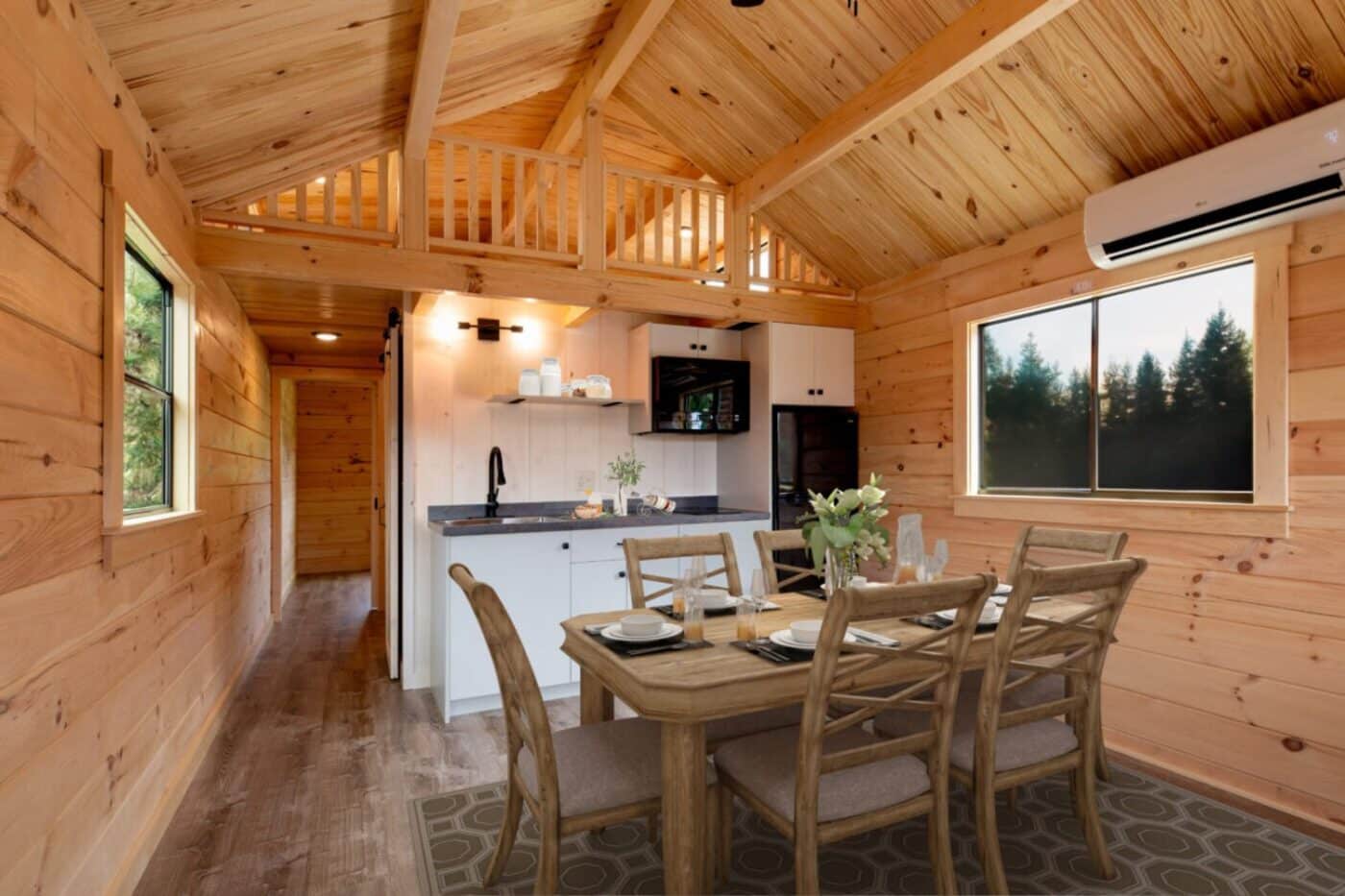
Unfortunately, not every county and city within Tennessee allows tiny homes. Regulations are always changing, so be sure to check back regularly to see what code your home must follow in your area of Tennessee.
Counties in Tennessee That Don’t Allow Tiny Homes
Does Crockett County, Tennessee allow tiny homes?
No. Unfortunately, at this time, Crockett County, Tennessee, does not allow tiny homes. Crockett County suspended permit approvals for tiny houses in December of 2023 in the hopes of establishing ground rules before they could be permitted within the county again. This means that it is likely that tiny homes could be allowed here in the future. Check in with your local planning and zoning office to find the most recent tiny home rules for your area, as regulations are always changing!
Does Gibson County, Tennessee allow tiny homes?
No. Unfortunately, Gibson County, Tennessee, does not allow tiny homes at this time. In an attempt to eliminate tiny houses, The county passed an ordinance that required single-dwelling houses to have a minimum of 960 sq ft. These specifications do not apply to manufactured homes or recreational vehicles, which means that it is possible that some tiny homes will be allowed in some regions of the county. Check your local area’s planning and zoning code to determine if you can place a tiny house in your specific location or zoned district.
Does Obion County, Tennessee allow tiny homes?
No. Unfortunately, at this time, Obion County, Tennessee, does not allow tiny homes. The county purposefully passed an ordinance that allows homes as small but no smaller than 401 sq ft. and a second ordinance that prohibits the use of recreational vehicles as permanent residences. Since tiny houses are usually defined as being 400 sq ft and smaller and frequently zoned with recreational vehicles, it is unlikely that tiny homes are permitted in Obion County. However, regulations often vary widely by city or town within a county, so be sure to check your local area’s planning or zoning code.
Park Model Regulations in TN
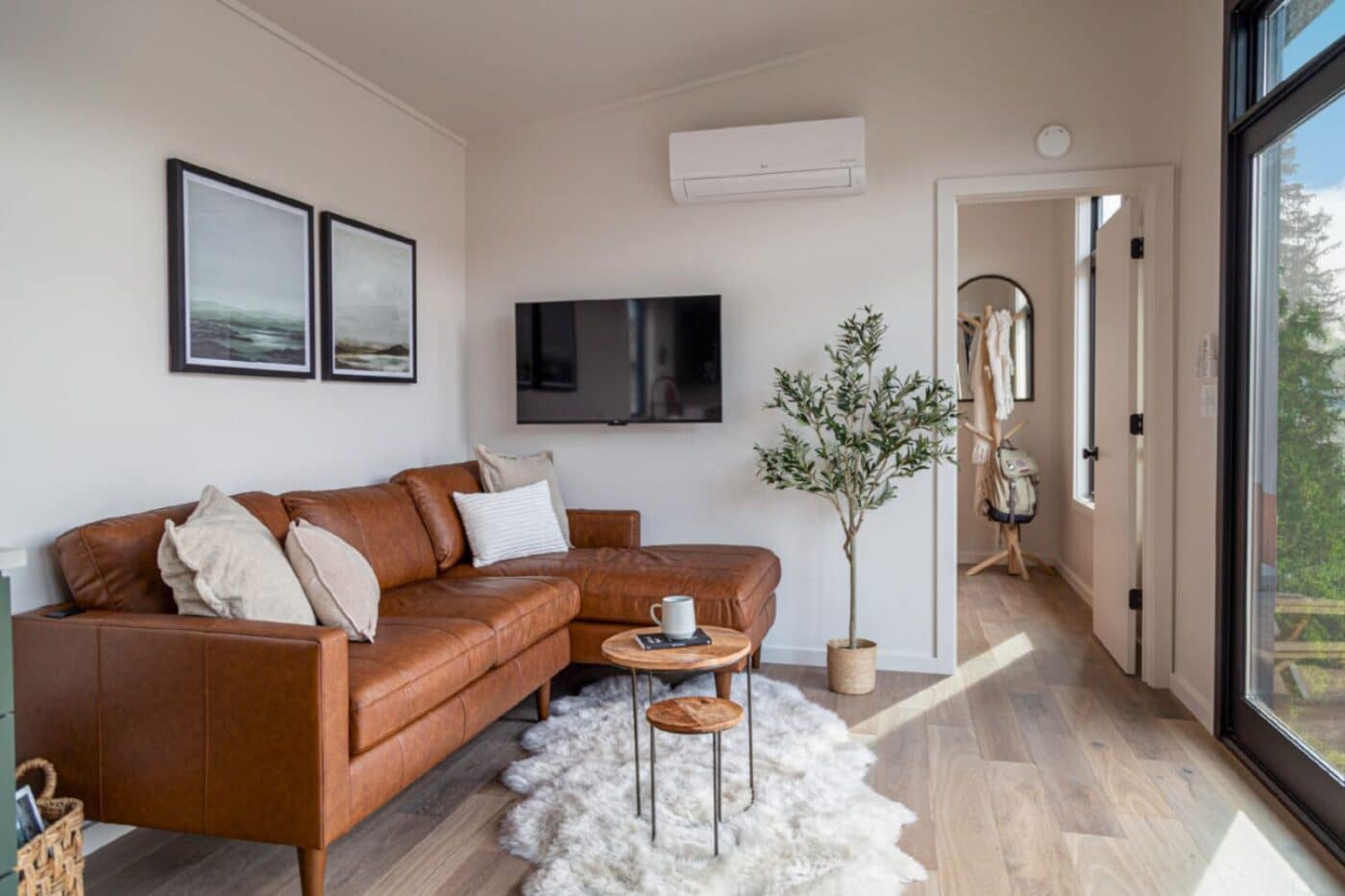
Can I live In a Park Model Home In Tennessee?
Yes! In most areas of Tennessee, you can live in a mobile home or RV full-time. You must adhere to the zoning laws where the house is placed. For example, some areas require park model homes to be on a permanent foundation, while others are less strict.
What are the rules for tiny homes in Tennessee?
The state of Tennessee has adopted the International Residential Code (IRC) which contains a special Appendix Q specifically for tiny homes. This appendix includes legal requirements for room size and dimensions for tiny homes, as well as loft design specifications, ceiling height rules, stairs and ladder specifications, and emergency escape requirements.
This means that your tiny home in Tennessee generally should have rooms no smaller than 70 sq ft and one room of at least 120 sq ft. The ceiling height of your tiny house should be smaller than 6 ft 8in, and a loft should be no smaller than 35 sq ft. Every sleeping room should have a window for emergency escape.
For a complete list of regulations, we recommend reading Appendix Q of the IRC in its entirety. You can find that code here!
Do you need a permit for a tiny home in Tennessee?
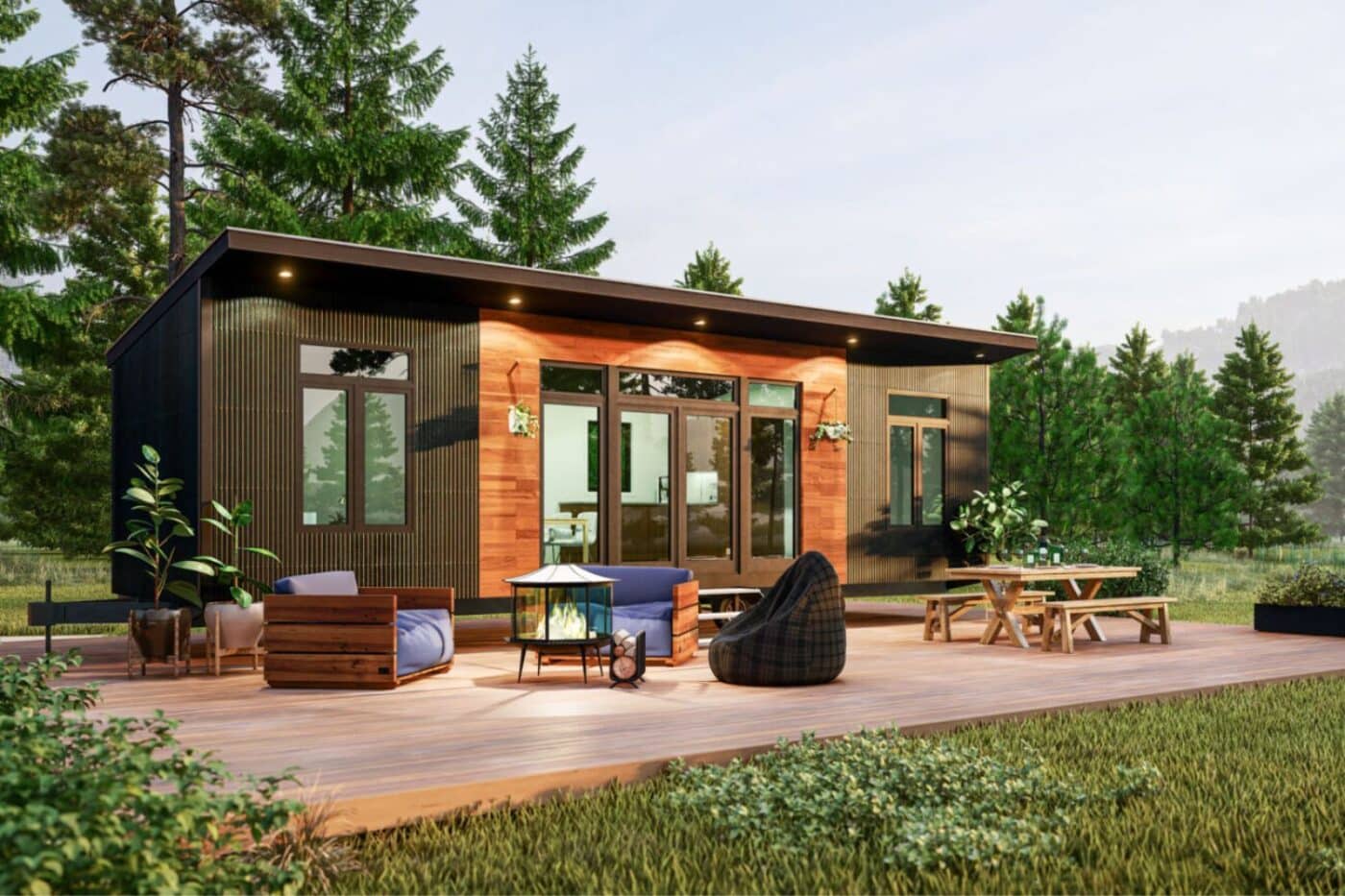
Yes. To build a tiny home in Tennessee, you need a residential building permit from the local building department. The permit process can differ based on where you live, so be sure to check what is required from you before you begin the process. The tiny home should also meet all safety and foundation requirements in order to obtain a permit. Additionally, the cost of building the tiny home may impact the permitting process and application fees.
Even if there are no building codes or permit requirements in your area, you are still required by state law to obtain an Electrical and Septic Permit from the State unless local jurisdictions have their own Building Inspections and Permitting.
Are There Tiny Home Communities in Tennessee?
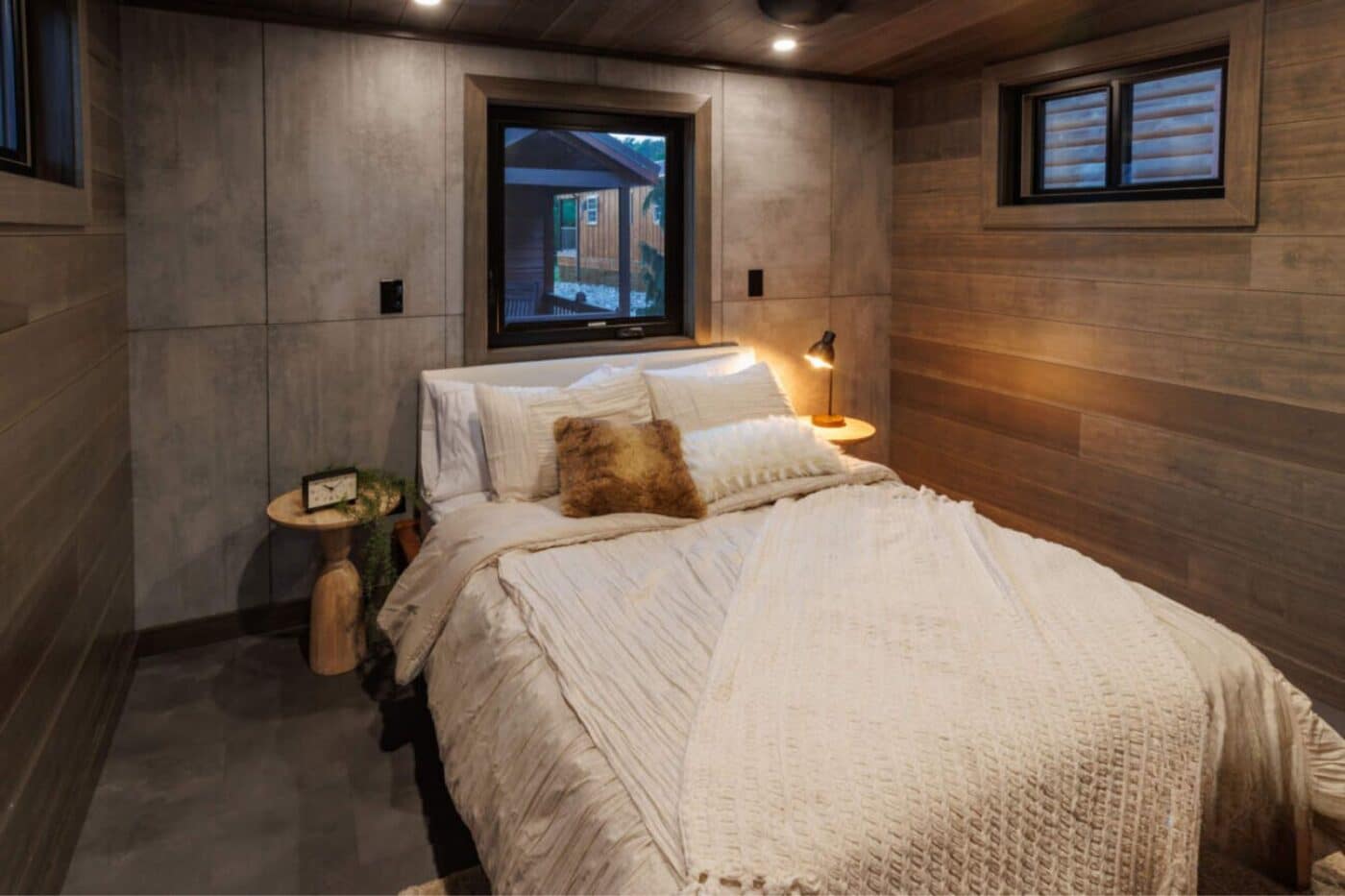
Yes! There are many tiny home communities in Tennessee. A tiny home community is a great place to visit to discover if tiny living is right for you! Visit, explore, or book a stay at a tiny home community in Tennessee to try it for yourself!
Living in a tiny house community allows like-minded people to create a community and share support and additional benefits. Living in a tiny home community encourages residents to live sustainably by sharing resources and community spaces for gardens and composting.
Check out these tiny home communities!
Lakeland Ridge RV and Tiny Home Community, 180 Lakeland Ridge, Bean Station, TN: Lakeland Ridge RV and Tiny Home Community overlooks Lake Cherokee and is nestled in the Tennessee forest. Tiny homes on wheels are welcome here, or tiny houses in the community are available for rent. The community is located about 15 minutes from Morristown and only about 45 miles northeast of Knoxville. Enjoy a scenic 60-minute drive to the Great Smoky Mountains and Dollywood in Pigeon Forge. The community also features a pavilion for gatherings, laundry and bathroom facilities, a small restaurant, walking trails, and a fenced dog park!
Piney River Resort, 6869 Piney River Rd. N. Bon Aqua, TN: With its tiny house rental options, Piney River Resort is a great place to try out tiny living for yourself. Love what you experience? Then come back to park your park model tiny home at one of its 60 RV Sites! The community offers a pool, laundry facilities, parkwide WiFi, picnic areas, campfires, river access, and scenic trails.
The Retreat at Deer Lick Falls, 1867 Summerfield Rd, Monteagle, TN: Tucked in the mountains between Nashville and Chattanooga, The Retreat at Deer Lick Falls features hiking trains, one of Tennessee’s largest waterfalls, playgrounds, community pavilions, fire pits, and much much more!
The Retreat at Water’s Edge, 14139 US Hwy 41, Tracy City, TN: Enjoy lakefront living nestled in the South Cumberland forest of Tracy City. Home to one of the oldest operating bakeries in Tennessee and the iconic Fiery Gizzard Trail, this tiny home community has it all! Featuring 75 acres of lake, hiking trails, playgrounds, community pavilions, firepits, kayak stations, swimming pools, and more, this community is the perfect place to immerse yourself in the great Tennessee outdoors.
Tiny Homes Village at Rock Island, 340 Tiny Homes Way, Rock Island, TN: This Tiny Homes Village in the middle of Tennessee’s Rock Island City has over 45 acres of land and 200 tiny home lots! The community features gardens, recreational parks, BBQ areas, and a mail center. Conveniently located near McMinnville, TN, and 90 minutes from Nashville, TN, the home is also near Rock Island State Park and about 30 minutes from Cumberland Caverns.
Frequently Asked Questions About Tennessee Tiny House Laws
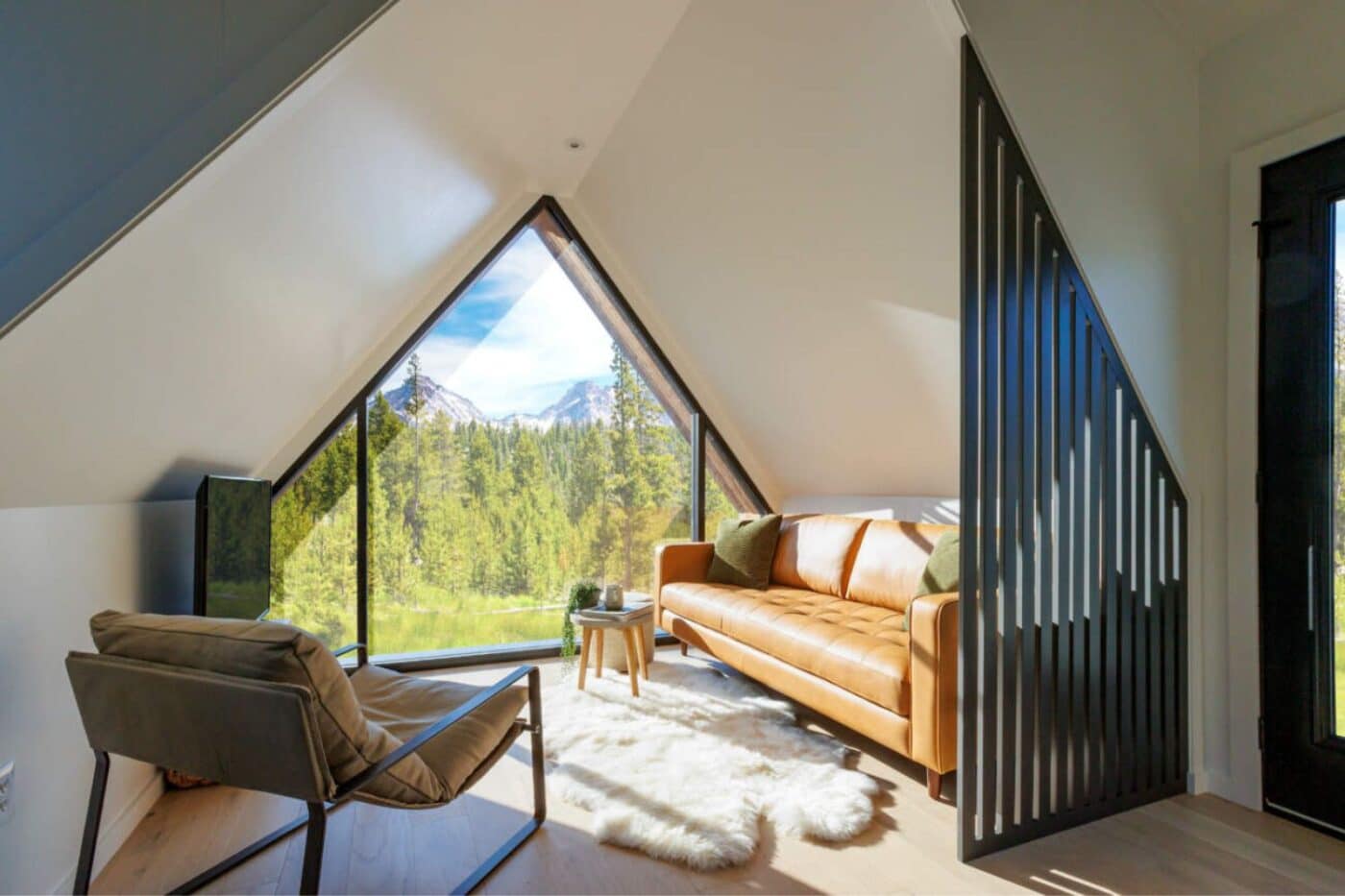
Can I Put a Tiny House on My Property in Tennessee?
Possibly! There are many areas in Tennessee where tiny houses are allowed for use as an Accessory Dwelling Unit or as a second residence on the same lot as a primary residential building. ADUs are not necessarily the same thing as tiny homes, but tiny homes can be used as ADUs.
ADUs are permitted in major cities in Tennessee, such as Knoxville and Nashville, and it is likely that ADUs are allowed in most other areas of Tennessee because few counties have adopted building codes.
To confirm you can place a tiny home on your property in Tennessee, check in with your most local planning or zoning office.
Still confused about the difference between ADUs and tiny homes? Read our blog all about ADUs here!
What is the Minimum Square Footage for a House in Tennessee?
There is no minimum square footage requirement for a house in Tennessee. However, Tennessee has other laws for residential dwellings, such as requiring at least one habitable room with a minimum of 120 sq ft. Each additional habitable room must have at least 70 sq ft.
How Much Does it Cost to Build a Tiny House in Tennessee?
It typically costs $30,000 to $60,000 to construct and own a tiny home in Tennessee, not including land or other fees. For more high-end park models, the cost can be much greater.
Request a quote for your tiny home for an exact Zook Cabins Tiny home cost breakdown.
Is it Legal to Live in a Camper on Your Property in Tennessee?
Yes, it is legal to live in a camper on your property in some parts of Tennessee. If the property and the county it is located in have no restrictions for foundations or sewer utilities, then it is legal. However, different areas of Tennessee have other restrictions, so it would be wise to check zoning and permit laws before moving into a camper.
Can You Live in a Converted Shed in Tennessee?
No. It is illegal to convert a shed into a tiny home or residential dwelling in the state of Tennessee. The state fire marshal states that it is against state law to modify ready-removable structures for use as residential, recreational, or emergency housing in Tennessee.
Can I Build an ADU on my Property in Tennessee?
Absolutely! In most places in Tennessee, it is legal to build an Accessory Dwelling Unit (ADU) on your property. Specific regulations and requirements will depend on your local zoning ordinance, and usually, only one ADU is permitted per lot in Tennessee. There are a number of design and construction standards ADUs should follow in Tennessee, such as architectural consistency, utility service requirements, permit applications, and setback requirements. Check-in with your local zoning office to ensure you have a complete list of requirements for an ADU in Tennessee.
Can You Permanently Live in a Tiny Home in Tennessee?
Yes! You can permanently live in a tiny home in Tennessee. Of course, tiny home regulations vary by county and city, but in most areas, tiny houses are legal for permanent residency in some form. Check with your local regulations to ensure that you are following all tiny home laws for your area of Tennessee.
How Many Square Feet Does a House Have to be to be Considered a Tiny House in Tennessee?
In Tennessee, a house is usually considered a tiny house if it is equal to or between 120 sq ft and 400 sq ft.
Tiny homes that can be used as permanent primary residences are generally 400 sq ft or less. Smaller houses can be as large as 1,000 sq ft. At Zook Cabins, we sell Park Model-style Tiny Homes that are as small as 255 sq ft and as large as 400 sq ft. We also offer accessory dwelling units (ADUs) as small as 491 sq ft and as large as 848 sq ft.
Do I Need a Permit to Build a Tiny House on my Property in Tennessee?
Yes, you will most likely need a permit to build a tiny house on your property in Tennessee. Specific regulations will vary based on your local county or city regulations. However, if your location has adopted a building or zoning code, you will more than likely need a permit to build any residential structure.
What do other states have to say about park model tiny homes?
Sadly, there is no one-size-fits-all for park model home regulations. However, at Zook Cabins, we have created a regulation guide for each state we serve. So take a look and see where else you can live tiny and dwell beyond the ordinary.
